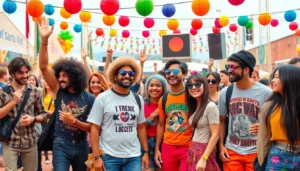Table of Contents
ToggleEvery awards season, the air buzzes with excitement—and a sprinkle of outrage. When nominations roll in, fans and critics alike gear up for a thrilling ride, but it doesn’t take long before the dreaded “snub” discussions take center stage. Whether it’s a beloved film overlooked for Best Picture or a talented actor left off the list, these snubs spark passionate debates that can rival the Oscars themselves.
Understanding Award Snub Discussions
Award snub discussions often arise when prominent films or actors do not receive nominations. Critics point out that various factors contribute to these omissions, such as industry biases or campaign strategies. Many fans feel passionate about their favorite performances, leading to heated debates on social media.
Responses to snubs vary significantly. Some audiences express disappointment, while others defend the selection process. The perception of fairness plays a crucial role in these conversations. When an actor’s breakthrough performance goes unrecognized, the community often rallies to highlight their achievements.
Data supports claims of snubbing trends. For instance, the 2022 Academy Awards featured numerous notable omissions, resulting in widespread discussions. Many believe that diversity and representation in nominations remain crucial issues within the industry.
Certain award categories seem more prone to snubs. Best Director and Best Actress categories frequently generate debate over deserving candidates overlooked. These conversations reflect a broader conversation about inclusivity, leading to calls for reform.
Media outlets also influence award snub discussions. Articles and opinion pieces analyze nomination patterns, often shedding light on potential biases within voting bodies. The role of public relations strategies in securing nominations cannot be overlooked either.
Ultimately, award snub discussions serve as a barometer for public sentiment regarding deserving talent. While opinions differ, the common thread remains a desire for recognition of excellence in filmmaking and performance. Passion for cinema drives these conversations, ensuring they remain a vital aspect of the awards season.
Historical Context of Award Snubs
Award snub discussions have a long history in the entertainment industry. They often reflect larger societal themes and biases present within the awarding bodies.
Notable Past Snubs
Many iconic films and performances faced significant snubs. For example, “Psycho” (1960) received only four nominations at the Academy Awards despite being a critical success. Another instance includes “The Shawshank Redemption” (1994), which lost the Best Picture award to “Forrest Gump,” despite its enduring popularity. Similarly, actors like Greta Gerwig and Jennifer Lopez have experienced notable omissions during their careers, leading to debates about gender parity and recognition in the industry. Such cases often reignite conversations about the criteria for nominations.
Impact on the Industry
Snubs seldom go unnoticed, prompting conversations about representation in Hollywood. They often lead to changes in award voting practices and increased scrutiny on nomination processes. Public outrage over overlooked talent fuels campaigns for inclusivity and diversity among nominees. Certain awards organizations have responded by implementing reforms aimed at expanding their voting membership. These shifts impact how films are marketed and the strategies employed by studios to promote their contenders. The ongoing discourse surrounding snubs influences not just award visibility but also industry standards for recognizing talent.
Recent Award Snub Discussions
Award snub discussions continue to generate significant buzz during awards season. This year, notable omissions once again dominated conversations among fans and critics.
Key Examples from Recent Years
Prominent snubs persisted in recent awards cycles. For instance, the 2022 Academy Awards faced backlash for the exclusion of films like “Tick, Tick… Boom!” and “The Last Duel.” Many industry insiders believed these selections deserved recognition. Likewise, critics raised eyebrows over the lack of nominations for actors such as Lady Gaga and Daniel Kaluuya in their respective categories. A growing consensus acknowledged that a diverse array of performances often goes unnoticed. This trend highlights ongoing disparities in the recognition of talent.
Public Reactions and Backlash
Reactions to award snubs vary widely. Many fans express disappointment on social media platforms, fueling heated debates. Others argue that the selection process reveals deep-rooted biases within the industry. Prominent voices advocate for change, demanding transparency and fairness in nominations. Some viewers organized online campaigns supporting overlooked performances, amplifying calls for inclusivity. A marked increase in public discourse reflects heightened awareness of representation issues. Discontent from audiences signals a strong desire for recognition of excellence across a broader range of artistic contributions.
The Role of Social Media in Award Snub Discussions
Social media platforms serve as central hubs for discussions about award snubs. Fans and critics alike engage in passionate conversations, sharing their thoughts and reactions. Tweets, posts, and videos highlight moments of disbelief when deserving films or actors are overlooked. Increased visibility allows public opinion to shape narratives around nominations.
Popular channels, like Twitter and Instagram, amplify voices, creating trending topics around snubs. Hashtags often emerge, bringing attention to specific omissions and unrecognized talent. Entertainment news sites frequently cite social media reactions, showcasing the public’s sentiments and frustrations.
Quickly, social media users mobilize to advocate for change. They create campaigns aimed at increasing awareness of diversity and representation issues. Online petitions often emerge, urging industry reform and greater inclusivity in nominations. Many discussions emphasize the need for transparency in the selection process.
Critics analyze social media trends to gauge public sentiment surrounding awards. The frequency of discussions on these platforms reflects a broader cultural shift towards representation and acknowledgment of diverse voices. Participation in these conversations fosters community engagement, allowing fans to connect over shared passions.
Reactions vary significantly based on personal connections to the omitted work. Some express disappointment, while others defend the nominated selections, arguing for fairness in judging artistry. Each season, reluctance to overlook deserving talent fuels dialogue and, in turn, influences future awards processes.
Award snub discussions are more than just debates over nominations; they reflect a deeper yearning for fairness and recognition in the entertainment industry. As audiences engage passionately on social media, these conversations highlight the ongoing challenges of diversity and representation.
The fervor surrounding snubs not only shapes public opinion but also influences future awards processes. With each awards season, the dialogue continues to evolve, emphasizing the importance of inclusivity and transparency. Ultimately, these discussions serve as a vital reminder of the power of cinema and the collective desire for all deserving talents to be acknowledged.







